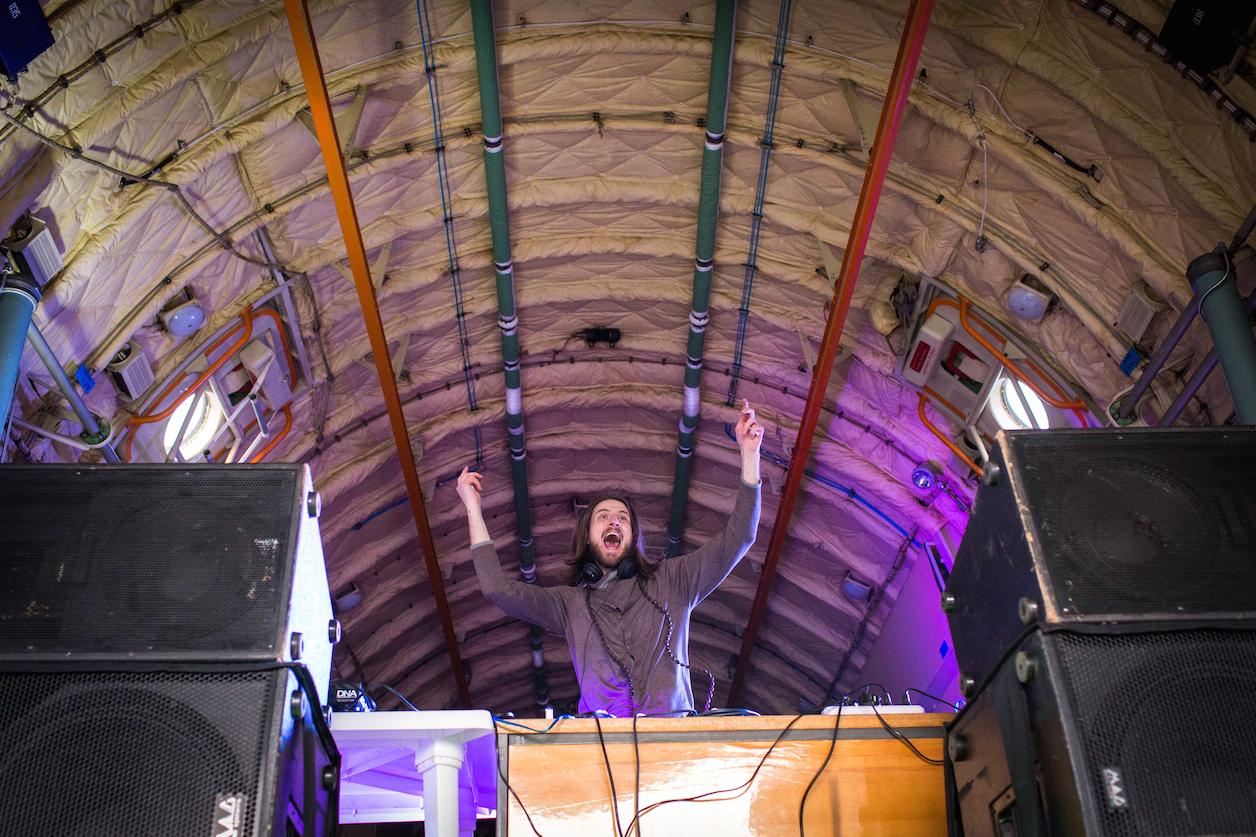Not everyone is afraid of Ukraine’s economic crisis
A DJ performs inside a disused airplane on Saturday at a open-air festival in Kyiv, Ukraine, poking fun at Ukraine's economic crisis.
KYIV, Ukraine — There was food, booze, smiles and sunshine — as well as one overarching theme: panic and hysteria.
When thousands of mostly middle-class Ukrainians flocked to an open-air festival at an aviation museum here over the weekend, they did so in mock defiance of the economic crisis gripping their cash-strapped country.
There was a poor man’s fashion show — ponchos featured prominently — and a raffle for free public transit rides, worth around 7 cents. The private organizers charged a symbolic entry fee: 25 hryvnia, the current street value of $1.
Sure, their currency has plunged and the economy has shriveled, promising a grim outlook for 2015. But some Ukrainians aren’t letting that get them down.
“You need to help unite people in order to conquer their fears through humor,” said Tatyana Yaitskaya, the festival’s chief organizer.
For the past year, Ukraine has been fighting a war with Moscow-backed insurgents and struggling to hold together a country still reeling from revolution. That's resulted in a sputtering economy almost entirely dependent on Western loans.
But you wouldn’t quite know it just by hanging around the country’s capital Kyiv, the birthplace of last year’s pro-democracy uprising and the cradle of Ukraine's fledgling middle class, which experts say makes up 14 percent of society.
Some here, like Saturday’s festival revelers, are reacting to their country’s economic woes with a mix of resilience, resignation and irreverence.
That might seem strange, given the latest startling statistics.
Last year, the economy contracted 6.8 percent, according to fresh state figures. The currency, meanwhile, has lost 60 percent of its value against the dollar in the past year.
Ukraine’s finance minister, US-born Natalie Jaresko, believes the hryvnia can maintain its current rate (1 hryvnia equals 4 cents) for several years if the government succeeds in implementing key reforms.
But that’s assuming Western creditors follow through on their pledge of $40 billion over the next four years and then some — support, she told the Financial Times on Monday, which is “absolutely critical.”
Nevertheless, says Andriy Bychenko, a sociologist at the Razumkov Center think tank in Kyiv, many Ukrainians believe they’ll be spared the very worst.
“You can’t say they’re looking at this with optimism,” he said, “but in any case the majority [of the population] doesn’t expect a collapse.”
That might prove especially true in major cities like this one, where salaries and the general standard of living are much higher than anywhere else in the country.
Despite the dismal economic stats, it’s not unusual to find the city’s bars, cafes and hipster hangouts packed on weekdays and bumping late into the night.
How #Kyiv/#Kiev hipsters do. #можжевельник #globalpost
A photo posted by Dan Peleschuk (@dpeleschuk) on
But that doesn’t mean their visitors are unfazed.
Last month, around the time the hryvnia plunged 10 percent in a single day, festival organizer Yaitskaya created a Facebook event of “panic and hysteria” for some 200 friends.
It started as a joke to help blow off some steam. But in no time, 17,000 people signed up and the festival — dubbed “On the bottom” — became a reality.
The main goal, she said, was to use humor as a way to urge her friends, acquaintances and other Kyivans of relative means to live more modestly. For some, that might mean no more imported food, flashy new cellphones or expensive trips abroad.
Unemployment here already hovers around 9 percent and is almost certain to get worse.
“I want to tell people that the crisis is not an apocalypse, as some have begun to think,” Yaitskaya, who edits a glossy magazine, told GlobalPost. “It’s just a new model of consumption.”
Festival-goers took to that spirit with aplomb.
Among the many features were second-hand clothing exchanges and lectures on how to spend a day without cash and how to make a chicken last for a week. There was even a “Museum of Nostalgia,” a wall where visitors posted photos of luxury items and their newly inflated prices. Revelers danced on the grass to techno jams played by a DJ set up inside a disused cargo plane.
A photo posted by Dan Peleschuk (@dpeleschuk) on
“It’s difficult, but I’m confident that we’ll pull through,” said Kostya Krekoten, a 38-year-old small business owner.
Having spent some time in the printing business, he tried his hand in catering before launching a small crafts company six months ago.
Nowadays, Krekoten sells handmade lamps and other colorful, thrifty woodworks he hopes people might find useful.
“I can’t say that I’m taking any sort of drastic measures [to cope with the crisis],” he said. “I just look for new ideas here and there.”
Ukrainians in the bigger cities might be coping well enough so far. But countless others are suffering the effects of crippling inflation on basic goods, such as food, and rising utilities costs.
Bychenko, the sociologist, agrees that any overtures aimed at boosting Ukrainians’ collective resolve is helpful in the current crisis.
Nonetheless, he adds, “the real situation is not as happy and colorful as that festival was.”
Yaitskaya, for her part, says her event was meant to poke fun at middle-class Ukrainians, and force them to think about the majority of their compatriots who live far worse.
“We need to help those for whom things really are tough,” she said.
“When people around us are sitting in their apartments eating normally, buying new cellphones and then complaining — that’s not right.”
We want to hear your feedback so we can keep improving our website, theworld.org. Please fill out this quick survey and let us know your thoughts (your answers will be anonymous). Thanks for your time!
